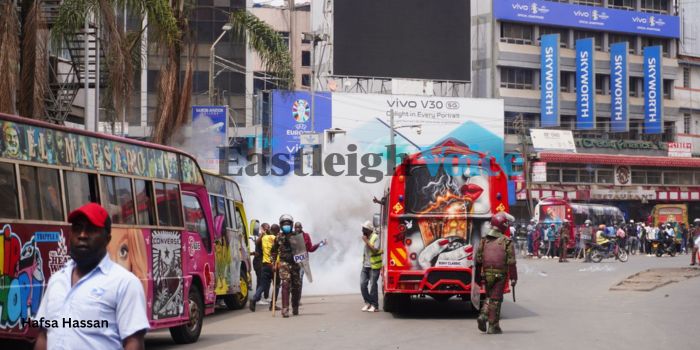End criminalisation of protests and respect law, Amnesty tells Kenya's security organs

Amnesty stressed the need for the National Police Service (NPS) and the Kenya Defence Forces (KDF) to strictly operate within the confines of the law during the #OccupyEverywhere protests.
Amnesty Kenya has called on Kenya's security organs to respect protesters' fundamental rights as some parts of the country witness sustained anti-government protests that began three weeks ago.
In a statement on Tuesday, Amnesty Executive Director Irungu Houghton expressed concern over recent incidents involving the use of what he termed unnecessary force by the police.
More To Read
- Amnesty exposes state-backed harassment network during Kenya’s 2024–2025 Gen Z protests
- Senators call for real-time CCTV monitoring in all cells to curb police brutality
- Uhuru played key role in securing release of activists Njagi and Oyoo – Irungu Houghton
- Rights groups demand repatriation of Kenyan teacher shot dead in Tanzania
- Pamzo rues draw with Murang’a Seal, eyes bounce-back against Police
- Police break up demo at Mudavadi’s office as anger grows over Kampala abductions
"The response of the authorities over the past two weeks has involved unnecessary and excessive force, resulting in the tragic loss of life and the infliction of serious injuries," the statement said.
On Monday, the Kenya National Commission on Human Rights (KNCHR) reported that 39 people had been killed, the youngest being 12-year-old Kennedy Onyango. It also reported 39 cases of forced disappearances and 361 injuries countrywide.
So far, police have killed 39 people, including 12-year-old Kennedy Onyango, and at least 361 others have been severely injured nationwide. Medical personnel aiding the injured have faced teargas and arrests. We demand accountability. Stand with us https://t.co/nozTCodtCB
— Amnesty Kenya (@AmnestyKenya) July 2, 2024
Amnesty stressed the need for the National Police Service (NPS) and the Kenya Defence Forces (KDF) to strictly operate within the confines of the law during the #OccupyEverywhere protests.
"Amnesty International reminds the National Police Service and the Kenya Defence Forces of June 28, 2024, High Court ruling in Malindi, which issued temporary orders preventing security agencies from using lethal and other less-lethal ammunition against peaceful protesters," Houghton said.
The court barred the NPS from using water cannons, tear gas, live ammunition, and other draconian tactics against peaceful protesters, among them unnecessary arrests, abductions, detentions, harassment, intimidation, torture, and any cruel or degrading treatment.
The police overseeing the protests were also ordered not to deploy brute force or any form of violence or commit any extrajudicial killings.
Joint Statement: In partnership with @ICJKenya, we remind the @kdfinfo & @NPSOfficial_KE that Kenya is not in a state of emergency. Military deployment in protests must respect our Constitution & human rights laws! #ProtectTheProtest https://t.co/hXWxG8KEKK pic.twitter.com/fUHCk2DhZF
— Amnesty Kenya (@AmnestyKenya) June 27, 2024
Amnesty noted that during last week's demonstrations, medical personnel attending to casualties faced tear gas exposure, arrest, and intimidation by law enforcement and military officials.
"Additionally, lawyers attempting to support their clients have been denied access and subjected to arrests and harassment, while journalists covering the protests have been targeted with confiscations of equipment, arrests, and physical assaults in broad daylight," Houghton said.
He called on Kenya's security organs to cease the criminalisation of protests and strictly adhere to legal frameworks.
Top Stories Today














































